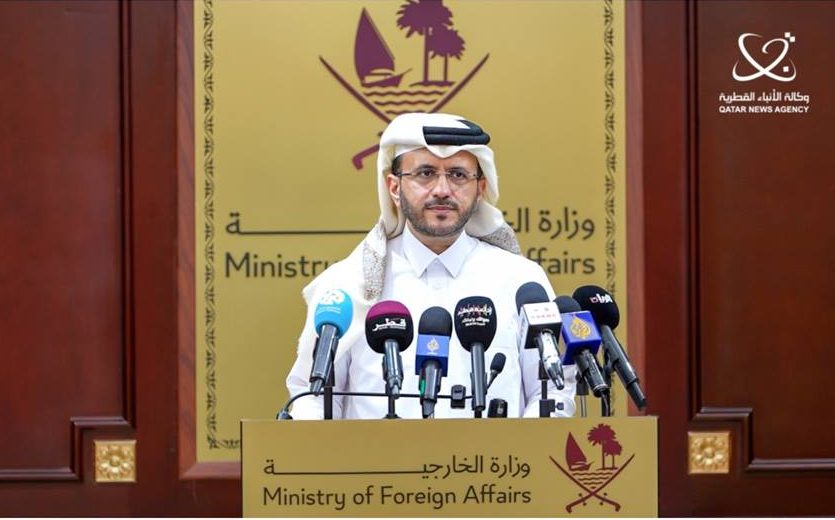On Tuesday, Netanyahu threatened that Israel “will finish the job in Rafah,” where more than one million displaced Palestinians have been sheltering amid the brutal onslaught.
Israeli Prime Minister Benjamin Netanyahu is one of those with “the keys to securing a deal” in Gaza, Qatar’s Foreign Ministry spokesman Majed Al-Ansari told CNN on Tuesday, noting that the negotiators are “nowhere near a deal.”
“There are those, including Netanyahu, who have the keys to securing a deal right now. We urge them to consider doing a deal right now, because every day that goes by is a risk to the lives of the hostages, to the lives of civilians in Gaza,” Al-Ansari said.
The Qatari official added that “there are a lot of ways” to reach a humanitarian pause in hopes of securing more “robust” negotiations.
“We are nowhere a deal at the moment, however we are working day and night to make sure that we have the right ideas going across between both sides,” the Qatari official noted.
Al-Ansari’s remarks as Qatar continues its mediation role in hopes of securing a deal in Gaza that would eventually lead to a ceasefire.
Ramadan has started without a ceasefire in sight, with Palestinians marking the holy month under non-stop Israeli bombardment and an extreme shortage of basic resources.
Since the beginning of the war on October 7, 2023, Israel has killed at least 31,184 Palestinians while wounding 72,889 others.
Qatar, the host of a Hamas political bureau, has been working alongside Egypt and the United States since the start of the war to release more than 240 captives from the Palestinian group under wider efforts to end the war.
Last year, Qatar and Egypt mediated a truce that lasted between November 24 and December 1, enabling the release of at least 110 Israeli and foreign captives from Gaza.
The deal led to the release of 242 Palestinian women and children from Israeli prisons, though Israel re-arrested at least 11 of those who were released since the beginning of the year.
Since the start of the war, Israel has cited releasing all captives as part of its goals, despite killing at least 70 of their own in Gaza.
The negotiations have witnessed no breakthrough since the previous pause amid Israel’s non-stop bombardment while vowing to advance into densely-populated Rafah. On Tuesday, Netanyahu said Israel “will finish the job in Rafah.”
Hamas’ key demand since last year has been a comprehensive ceasefire, something that Israel and the U.S. have opposed.
Talks in Cairo last week between officials from Qatar, the U.S., and Hamas failed to achieve a breakthrough after Israel rejected the Palestinian group’s demand for a ceasefire.
Sources had told Al Jazeera on March 7 that “the mediators in Cairo tried to bridge the gap between Hamas and Israel, but their efforts did not succeed.”
Worsening humanitarian situation
Al-Ansari also tapped into the dire humanitarian situation in Gaza, where the 2.2 million population is grappling with dangerous levels of starvation and a significant absence of basic services.
“It is a shame on all of us, on all humanity, that in the negotiations we have to negotiate over aid and that is used as leverage in the negotiations. This is in violation of all international humanitarian law and it’s a violation of our humanity,” he told CNN.
Speaking at a weekly press briefing in Doha on Tuesday, Al-Ansari confirmed that Qatar is joining countries financing the entry of aid into Gaza through the American sea corridor.
The first ship left the Larnaca port in Cyprus to Gaza on the same day, carrying around 200 tonnes of food aid for Gaza, U.S.-based charity, World Central Kitchen (WCK), announced.
Al-Ansari stressed that the aid is still “minuscule” in comparison to truckloads that can enter through the border crossings, most notably through the shared Rafah Crossing with Egypt.
He also pointed to the humanitarian catastrophe in northern Gaza, where aid and aid workers have not been able to reach the population.
“The situation in the north, now we have in some reports more than 300,000 people completely cut off from civilization, dying out of reasons that can be rectified just meters away across the border,” the Qatari official said.
“Bodies are being eaten by dogs at this rate in the north, it’s unbelievable, it’s inhumane, and it’s a test for all of us,” he added.
As of Tuesday, at least 27 people, including 21 children, died due to malnutrition and dehydration, according to Palestine’s news agency (Wafa). The figure is only expected to rise amid the continuation of the war and blockade.
The United Nations has also recorded at least 14 incidents involving shooting and bombing aid seekers in Gaza.
The first such incident was reported on February 29, when Israel attacked Palestinians collecting aid at the Nabulsi roundabout, killing more than 100 people.
Qatar had condemned “the heinous massacre” while calling on the international community to protect Palestinians in Gaza.







